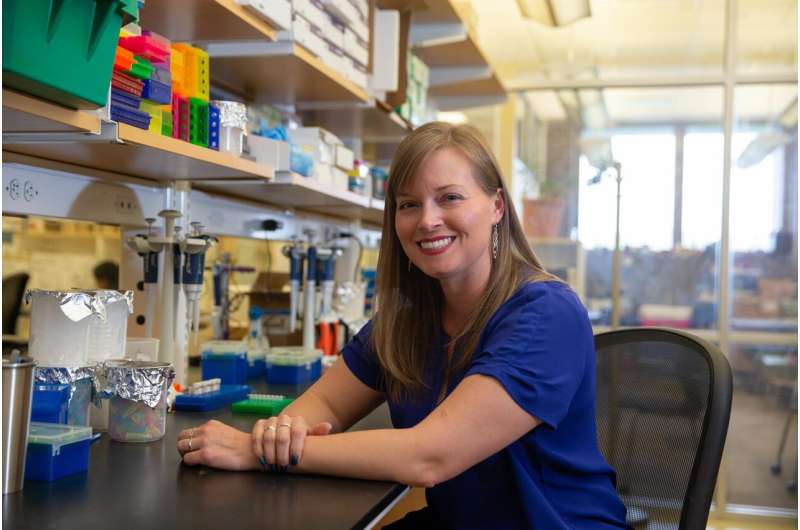This article has been reviewed according to Science X's editorial process and policies. Editors have highlighted the following attributes while ensuring the content's credibility:
fact-checked
peer-reviewed publication
trusted source
proofread
How to make the faculty job search less discouraging

Finding a full-time faculty job can be a daunting challenge for doctoral graduates. University of Cincinnati anthropologist Kathleen Grogan says postdoctoral researchers can benefit from having peers review their applications.
She learned this herself while working as a postdoctoral researcher. She realized that she and other postdocs routinely solicited feedback in an online messaging app dedicated to aspiring scientists.
"I was on the job market and wanted people with broad scientific expertise to look at my stuff," said Grogan, an assistant professor in UC's College of Arts and Sciences. "And I saw there were repeated requests on the Slack channel asking people to look at their applications, too."
So she set up a pilot program that invited postdoctoral researchers to review each others' job application packages. These documents include a curriculum vitae, cover letter and research, teaching and diversity statements.
She wrote about the pilot program in a study published in the journal Proceedings of the Royal Society B.
Postdoctoral research is a bit like career purgatory—a weigh station between defending a doctoral dissertation and accepting that first academic faculty position.
"It's a precarious existence and you feel it," Grogan said. "A postdoc has to apply for new jobs almost immediately. I was very aware of my last paycheck."
While a job application might seem straightforward, how qualified candidates present themselves and their work can make all the difference in piquing the interest of a hiring committee, Grogan said.
"In my experience in academia, there is a minimum threshold of competence and competitiveness you have to hit," Grogan said. "Having polished materials can be a critical factor between getting an on-campus interview and not."
Grogan set up a system where postdoctoral researchers volunteered to give or accept objective critiques with peers. In three years, participants helped review applications of 150 early career academics.
Afterward, Grogan and her research collaborators circulated anonymous surveys among the job seeking participants. Most found the program's feedback to be helpful, even among postdocs who were still searching for a faculty position.
Study co-author Erin Kane, a scientific program manager at Boston University, took advantage of the peer review network. While she hasn't landed a faculty position yet, she took comfort in knowing she wasn't alone.
"I was one of only a few postdocs in my department and the only postdoc in my lab," Kane said. "Knowing that there was a community of people in my position who were willing to spend time helping me and that I could spend time helping them was really valuable at a career stage that can be extremely isolating."
The program provided psychosocial support as well, Grogan said. And this is valuable, she said, because a majority of postdocs can get discouraged by an academic job in a field where applicants far outnumber positions. Many pursue careers in government, nonprofits or industry instead.
"The biggest leak is between grad school and the first faculty positions. That's when academia loses people," Grogan said.
The pilot program helped postdocs see that others were dealing with the same stresses and anxieties of the job search. Postdoctoral researchers often take temporary appointments far from home in places where they have few friends or relatives.
"It gets very isolating and lonely," Grogan said. "You can't associate with faculty because they're your bosses. And senior grad students are working."
The job search, too, can be discouraging.
"It might take you a year or more to find a job. I applied for 60 jobs and got two offers. It's a lot of rejection," Grogan said.
Co-author Carlos Guardia, a principal investigator at the National Institutes of Health, said the pilot program gave postdocs a roadmap to success, in part by offering examples of how other candidates were successful in their job search.
"Without a doubt, it helped me," Guardia said. "COVID-19 hit when I was a postdoctoral trainee. I suddenly lost my peer network, so this program was an amazing opportunity for me to find external and critical reviewers for my job applications. I got great feedback on my aims and goals."
After completing two research fellowships, Grogan in 2020 accepted a joint position in anthropology and biology at UC. Today, her lab studies the genomic diversity of ring-tailed lemurs, among other topics.
Grogan thinks her model could be useful to other scientific or academic groups looking to build community.
More information: Carlos M. Guardia et al, The power of peer networking for improving STEM faculty job applications: a successful pilot programme, Proceedings of the Royal Society B: Biological Sciences (2023). DOI: 10.1098/rspb.2023.0124
Journal information: Proceedings of the Royal Society B
Provided by University of Cincinnati




















